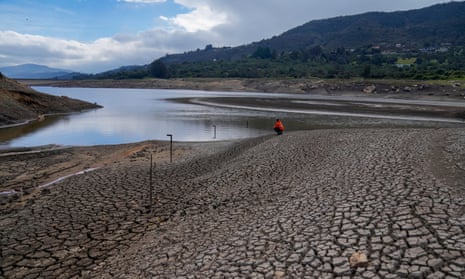Couples in Bogotá are being asked to shower together as water supplies are rationed in the Colombian capital.
Major neighbourhoods were cut off from the water grid on Thursday to preserve dangerously low water levels at reservoirs that have been starved of rain by the weather phenomenon known as El Niño.
“Shower as a couple,” said the mayor of Bogotá, Carlos Fernando Galán. “This is an educational exercise in saving water, nothing else. That kind of thing is going to help us a lot. Those behavioral changes are key.”
Galán also asked residents to consider abandoning their daily hygiene practices entirely given the reservoirs were at “historic lows”.
“If you are not going to leave your house on Sunday or any other day of the week, take advantage of it and do not take a bath,” he pleaded ahead of the water cuts.
El Niño, which usually causes lower rainfall in South America, has caused record-breaking droughts and temperatures this year, forcing administrations across the region to enact emergency measures.
Nestled in the Andes mountains 2,600m (8,500ft) above sea level, Bogotá has been spared the most apocalyptic scenes. The usually rainy capital receives 1,020mm (40in) of rainfall each year on average – nearly twice as much as London.
Still the abnormally long hot and dry spells have caused wildfires to rage in the forests surrounding the capital – choking some neighbourhoods with smoke – and now the reservoirs which some 10 million people rely on are at “critical” levels.
Supplies at the Chingaza reservoir, which supplies 70% of the capital’s water, are at 16% – the lowest on record.
Bogotá’s public water utility estimates there could be about 54 days’ worth of water left.
To prevent a disaster, local officials have divided Bogotá into nine zones, each of which will be cut off from the water grid for 24 hours on rotation.
The mayor did not say how long the measures would last but asked Bogotanos to reduce consumption so they could be ended sooner.
“Let’s not waste a drop of water in Bogotá at this time,” Galán told reporters this week.
Bogota is not the only major Latin American city forced to take action to combat drought. Mexico City has also been rationing water supplies in the past month and Guatemala declared an emergency on Wednesday as it struggles to tame wildfires.
Bogotanos were left wondering whether they should shower, for how long, and how many buckets to fill.
Few will probably take up Galán’s advice to stop bathing as Colombians are extremely hygiene conscious, said Mariana García Achury, a 34-year-old in the capital who said she was bathing with a bucket to conserve water.
“I really don’t think that is going to happen,” she said. “Or at least if they do, they won’t be telling anyone about it.”
